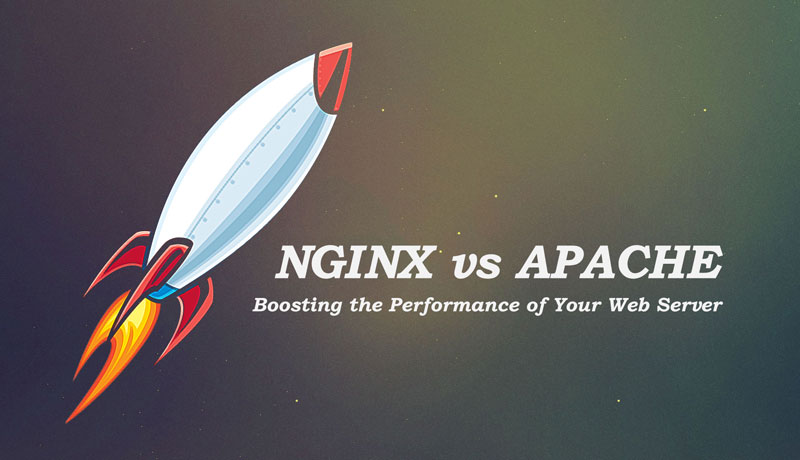About Apache and Nginx
Both Apache and Nginx is web-server software, that enables us to host website on a public internet.

Introduction of Apache
Apache is said to be the leading HTTP server software available on the web. It was initially developed and released as an open-source of installation and configuration patches for the NCSA HTTPD process in the year 1995. It has been rewritten from the ground up for two times since its development. It is of high industry standard and most of the web servers run on apache.
It is backend software that runs more than 60% of all websites out there and even for the web development and localhost projects, it stands on top.
Advantages of Apache
It is open-source software written by a novice for the fun of solving problems. The major benefit of this open-source development model is that many people are contributing to the source code of Apache, which means that bugs will get fixed quickly and constantly. New services in the open-source software will be slower in coming when compared to the internet information server. This is because there is not a marketing department which tries to find new things through which sales will be drawn. So, it is ensured that Apache which runs on Unix or Linux is stable, robust, and secure.
Apache as open-source software is distributed under license conditions which make the source code available for free. So, it is quite possible for everyone to download the apache server module and run it under windows even without paying any license fee. This is extremely crucial for web hosting companies as well as internet service providers who have to constantly increase the capacity of the server.
Disadvantages of Apache Server
Most of the apache installations go off without a hiccup or hitch whereas most of the Linux distributions bundle apache as a part of their installation process. They also have apache in already pre-configured and ready to run status. However, if you go tend to face any problem in the configuration, there is no central office to get technical support. Only forums on the web are available with full of people who faced the same problem and documented the solutions that they have obtained to them. The consequence of this is that if in case you have anything to fix, you must be comfortable with command line prompts and the cryptic Unix command sets as there is no setup wizards or handholding for beginners.
Introduction of NGINX
Nginx is said to be an open-source reverse proxy service confined for HTTPS, HTTP, POP3, SMTP, and IMAP products and also as an HTTP cache, load balancer, and a web server. The Nginx project commenced with a powerful focus on high performance, low memory usage, and high concurrency. Overall, Nginx leaves a very small footprint of processing data on your web server. It runs perfectly on BSD variants, Mac OS X, Linux, AIX, Solaris, HP UX, and other *nix flavors. It also includes a proof of concept port, especially for Microsoft windows. Nginx can be used to serve dynamic HTTP content using SCGI handlers for scripts, FastCGI, Python passenger module, or WSGI application servers and also as a software load balancer.
Also Read: What is NGINX? How NGINX Works?
Advantages of NGINX
Nginx can load balance connections to the application server and can even choose appropriate endpoints for reducing latency. It also provides more control over failure processes in which failing background machines can be removed out of rotation seamlessly.
Nginx helps in improving the performance in handling static content. This helps in keeping off the unnecessary traffic of the application server.
Server management can also be simplified with distinct layers for application servers and web servers. The application server can be taken down for maintenance sans affecting normal HTTP traffic.
Also Read: How to Improve Nginx Performance: Quick Tips
Disadvantages of NGINX
Nginx provides a hard time when it comes to creating modules. Hence, the developer has to find the function required to create the module with the internal code of the Nginx web server.
Apache vs. Nginx? Which is Better? Why?
Apache is a well established and flexible web server and is used by a huge number of customers all over the world for delivering static and dynamic content.
Apache efficiently runs on a wide range of OSes and is properly maintained. The ubiquity of apache indicates that a considerable amount of user-generated documentation is available.
Nginx is designed to be fast at serving the static web pages. If a site is obtaining a huge amount of concurrent hits that are seeking static pages, then Nginx design has advantages over other servers.
Apache comes with the ability to be customized.
It includes a set of rich features that can be extended and modified by using readily available addon modules to suit any different business and technical needs.
As Nginx is newer, it requires less support and documentation when compared to well-established web servers. Its lightweight design means that it can be extremely difficult to customize which is necessary for complex and large configuration.
As apache makes use of a primary process-based processing model, it tends to consume more memory under high server loads. This would result in degraded performance, even after the launch of Apache 2.4 recently, which promised improvements in caching and speed.
Nginx can be regarded as a newer rival to apache and is designed to be lightweight and simple and to obtain a few hardware resources than most other web servers.
Nginx accomplishes this by using an event-based processing model that requires less memory when compared to a process-based server uses.
Conclusion
Both Apache and Nginx are perfect solutions while they both have advantages as well as disadvantages. Depending on the technical requirements and needs of your business, you can choose the one which might be right for you. For new users, NGINX is a better option.
Leave a Reply